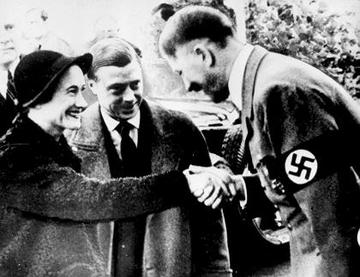Down With... Free Speech
When curating a film series devoted to "Cancel Culture" across history, there is a question that must inevitably be addressed.
Where does one begin?
The term Cancel Culture dates back to around 2014, but the concept (which the New York Times once described as "The public shaming of those deemed moral transgressors") has been around for much, much longer. Human history is overflowing with examples of specific groups systematically targeted and persecuted by other groups - often for allegedly moral reasons.
Over the next few months we will be seeing many films that explore this idea in various ways, but I wanted to begin with a (moderately) uncontroversial example.
Rest assured, we will be getting to the really controversial ones in due course, but first we're going to watch a movie about Nazis.
We may be living in an era when social and ideological divides are wider than ever (which is why so many people are cancelling so many other people) but at least we can all agree that Nazis Are Bad.
We do agree on that, right?
In any event, this week's film is about Nazis of the "World War II" variety.
Freedom Radio (or A Voice in the Night, as it was called in the US) was released in 1941 as a British wartime propaganda film, directed by Anthony Asquith. It tells the story of a German doctor who bravely launches a pirate radio station in an effort to combat the unending stream of lies, disinformation and propaganda being fed to the German people by the ruling Nazi Party.
Not all Germans are Nazis.
It's actually a little refreshing to see a war-time propaganda movie making a point of showing that not every single citizen of the opposing country is The Enemy. (No films of the period ever bothered to make a similar point about the Japanese.)
In other ways, the film is typical of British "war" pictures of the era. Its purpose was to galvanise the British public and drum up support for a long and difficult war (a war that, in 1941, promised no guarantee of victory).
However, Freedom Radio had another message; one that was rather more subtle, and which probably escaped the notice of the War Office at the time.
A few modern critics have been, shall we say, amused by the film's very British cast of actors, all playing Germans. It is certainly true that Freedom Radio boasts a cast that will be instantly recognisable to anyone who enjoys classic British cinema.
The deputy chancellor is played by Raymond Huntley (you may remember him as the manager of the local bank branch in Passport to Pimlico)...
This is not merely sloppy film-making. It is the true message of the film.
Not all Nazis are German.
Throughout the 1930s, fascism had not been remotely unique to Germany. Other countries had their own home-grown Fascists, and the UK was no exception.
Oswald Mosley and his "Blackshirts" had been outlawed at the start of the war, but his movement had enjoyed plenty of populist support throughout the preceding decade. Changing the law did not make his supporters simply evaporate; they were still UK citizens, living, working, voting, and almost certainly going to the movies.
King Edward VIII (who had abdicated in 1936) was also known to be a Nazi sympathiser. He and his wife had toured Nazi Germany (much to the unhappiness of the UK Government) and had he remained on the throne by 1939, his ideology would certainly have sparked a serious Constitutional crisis.
Freedom Radio may be set in Nazi Germany, but the film is much more interested in showing what a British fascist society might look like. The message of the film is not just how horrible things are in Germany; it also shows how seductive the Nazi ideology can be, and how easily it could take root - even in a society like ours.
That's what makes it such an unusual wartime propaganda film. As the UK was plunging deeper and deeper into a painful and unrelenting war against fascism, Anthony Asquith (the estranged son of former Prime Minister H. H. Asquith) directed a film that shows how anyone, anywhere, can be a Nazi.
We will be screening Freedom Radio at 730pm on Thursday, the 12th of January at the Victoria Park Baptist Church.

















Comments
Post a Comment